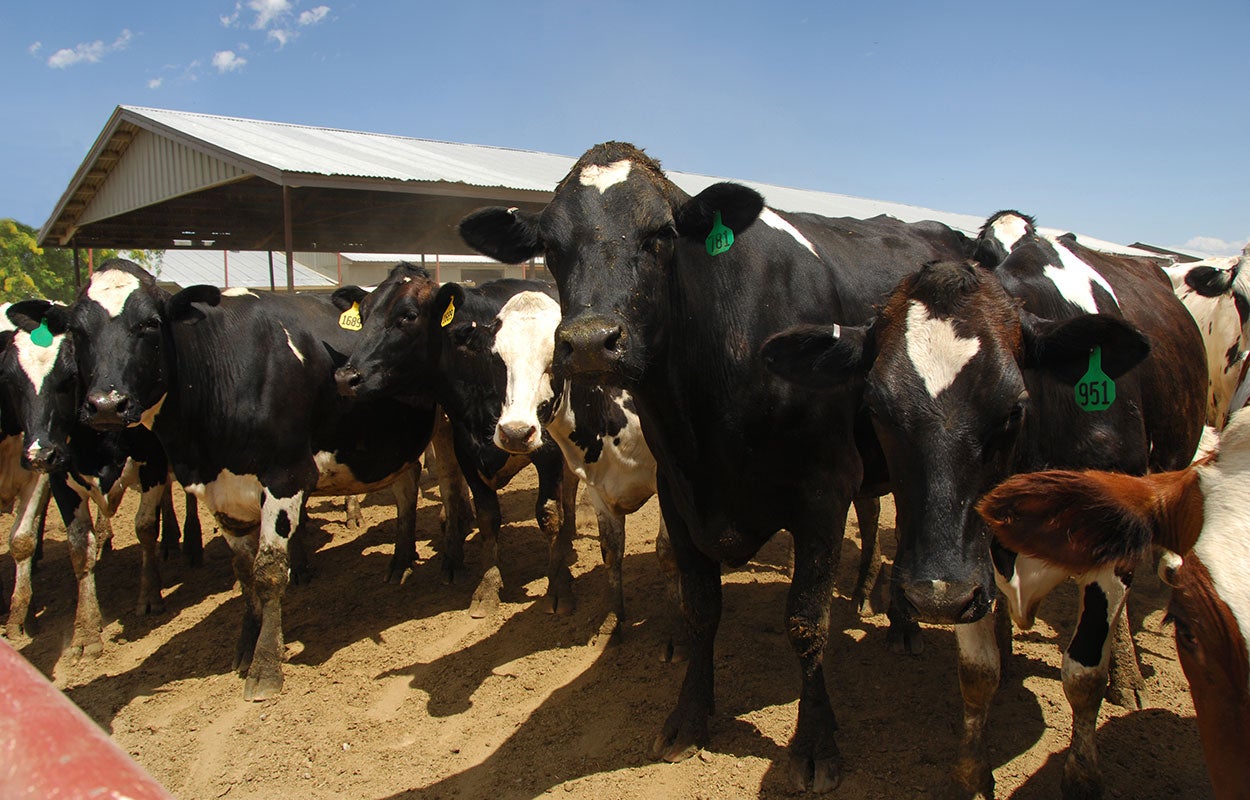
Source: South Dakota State University
Patricia Villamediana, SDSU Extension Dairy Field Specialist
Understanding Stressors

Dairy cows are susceptible to stress-triggering factors that can have a lasting effect on performance and animal health. Stress can generally be defined as the physiological or behavioral adjustment an animal makes to deal with a stressor and maintain balance, or homeostasis. Cattle count on this biological process that helps them survive. Stress affects every part of the body, so pregnancy and lactation may suffer its negative effects.
Stressors can be physical or social, for example, high temperature-humidity index, cold environment, animal-human relationship (handling, change in milking staff and other contact people), transportation, moving to a new pen (group changes), overstocking, herd hierarchy, poor cow comfort (flooring, and bedding). The recent significant weather events in South Dakota caused stress in dairy cows, too. Calving (even more the difficult birth) and dry-off cause stress in the dairy cow, however, these events are a normal part of the lactation cycle.
Animal Health Impacts
The stress response is the same for all stressors; specific portions of the brain are stimulated, leading to the secretion of hormones. In the event of a stress response, glucocorticoids (primarily cortisol) and catecholamines (adrenaline and noradrenaline) act to alter carbohydrate and protein metabolism, growth, reproduction and immune function. Upon the initiation of a stress response, a nutritionally demanding immune response may be stimulated. In cattle, cortisol has been associated with reduced rates of reproduction, suppressed milk production, suppression of the immune system causing greater disease susceptibility.
Short-term exposure to a stressor leads to a sharp increase in cortisol secretion. The long-term presence of a stressor causes chronic stress, which is often accompanied by reduced cortisol levels in the blood and/or reduced responsiveness of cells to cortisol, which may increase the risk of chronic inflammation. In dairy cows, chronic systemic inflammation increases the risk of infectious and metabolic diseases (mastitis, metritis, and others), impaired reproduction and lower milk production.
Stress has a negative impact on reproductive outcomes. It is expected conception rates for stressed animals to be extremely low. Cattle may abort due to stress. The alteration of the immune system by stressors leads to inefficient feed utilization, due to the consumption of nutrients by the immune system. Despite the increase in nutrients required by the immune system, activation of the immune system also leads to a decrease in feed intake, which further exacerbates the problem. Subsequently, reproductive efficiency and milk production are impaired.
Cortisol is continually released during a stress response and acts in the liver to synthesize more glucose. The pancreas then begins to release more insulin as it attempts to keep up with these changes in metabolism. This cycle caused by stress leads to insulin resistance and decreased glucose uptake by muscle and fat tissues. Therefore, reproductive efficiency and high levels of milk production both require optimum responsiveness of the cow’s cells to insulin.
“Which stressors are your dairy cows experiencing? Their economic effects can be significant, so developing a strategy to manage stress can be profitable.”
Supplementation Considerations
Stress conditions, such as trauma during a significant weather event, can induce Chromium (Cr) deficiency due to increased glucose metabolism, mobilization of Cr from body stores, and increased loss of Cr in urine. Cr, a required trace mineral, has the unique ability to bind to insulin receptors and allow glucose into cells. Cr supplementation minimizes the negative effects of the stress response by consistently decreasing serum cortisol during stressful periods for cattle and other species. Minimizing blood cortisol concentrations with the help of Cr is desirable to prevent the negative effects of cortisol on reproductive health and productivity.
The effects of Cr supplementation on production have been reported for the cases of heat-stressed cows, offering a potential protective management practice to lessen the effect of heat stress in dairy cattle. In normal cows, supplementation with Chromium-Methionine during the periparturient period can improve feed intake and may increase milk yield. It is demonstrated that Cr supplementation overcomes the effects of stress stemming from animal shipping.
Little is known regarding Cr concentrations in practical feedstuffs, and even less is known regarding the bioavailability of Cr from common feedstuffs. The forms and dosage of Cr supplementation vary so much. Chromium propionate is the only Cr source currently permitted for supplementation in cattle diets in the United States, which can be fed up to 0.50mg/kg in a complete mixed rations.
In Summary
Which stressors are your dairy cows experiencing? Their economic effects can be significant, so developing a strategy to manage stress can be profitable. Talk with your nutritionist about chromium supplementation for your cows during days of significant weather events and heat stress.
Further Readings
- Saman Lashkari, Mahmood Habibian, Søren Krogh Jensen (2018). A Review on the Role of Chromium Supplementation in Ruminant Nutrition-Effects on Productive Performance, Blood Metabolites, Antioxidant Status, and Immunocompetence. Biol Trace Elem Res.185 (2):305-321.
- MayBin-Jumah, Mohamed E. Abd El-Hack, Sameh A. Abdelnour, Yasmeen A. Hendy, Hager A. Ghanem, Sara A. Alsafy, Asmaa F. Khafaga, Ahmed E. Noreldin, Hazem Shaheen, Dalia Samak, Maha A. Momenah, Ahmed A. Allam, Abdullah A. AlKahtane, Saad Alkahtani, Mohamed M. Abdel-Daim, Lotfi Aleya (2020). Potential use of chromium to combat thermal stress in animals: A review. Science of The Total Environment. Volume 707, 135996









